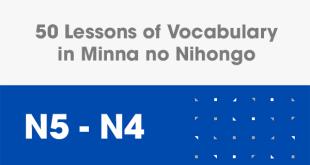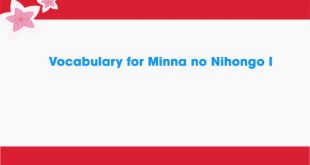The grammar is about the great points related to [ここ], [そこ], [あそこ] and [どこ]. In addition, we also learned more about the uses of [dùng] to talk about the origin of something and the extremely popular communication sentence pattern [そですか].
1. ここ / そこ / あそこ は N (location) です
Meaning: This place / that / that place is N (location).
[ここ] This place (near the speaker)
[そこ] That place (near the listener)
[あそこ] There (away from the speaker and the listener)
Usage: recommend, show someone somewhere
For example:
ここは うけつけ です。
This is the reception desk
To be polite and respectful to the person listening, we can use the following words with the same meaning:
[こちら] replaces [ここ]
[そちら] replaces [そこ]
[あちら] replaces [あそこ]
2. N は どこ / どちら ですか。
Meaning: Where is N?
[どこ], [どちら] all mean where, but [どちら] is more polite.
Usage: Ask what or who where
N can be mixed or human [ここ], [そこ], [あそこ]
For example:
トイレは どこ / どちら ですか
Where’s the toilet ?
ミラーさんは どこ / どちら ですか。
Where is Mr. Miller?
ここは どこ / どちら ですか。
Where is this ?
3. N1 は N2 (LOCATION) です
Meaning: N1 is at N2 (location)
N1 is a thing, a person [ここ], [そこ], [あそこ]
Usage: Indicates who or what is where
For example:
トイレは あちらです。
The toilet is over there.
ミラーさんは じむしょです。
Mr. Miller is in the office.
ここは きょうしつです。
This is the classroom.
4. N1 の N2
Meaning: N1 of / from N2
N1 is a country name or a company name, N2 is a product.
Usage: Talk about the origin, the origin of a product or a certain object
For example:
IMC のコンピューターです。
Computer of the IMC company.
To ask questions about the origin, origin of a certain product or item, we use [どこの] + products:
For example:
これはどこのワインですか?
What wine is this?
イタリアのワインです。
Italian Wine.
5. お国はどちらですか
Meaning: Which country are you from?
Use [どちら] to be polite in speech
Usage: To ask someone’s country
For example:
お 国 は ど ち ら で す か?
Where are you from?
日本です。
Japan.
Related Post: Minna No Nihongo Lesson 3 Vocabulary
 Learn Japanese Free Learn Japanese Free
Learn Japanese Free Learn Japanese Free







